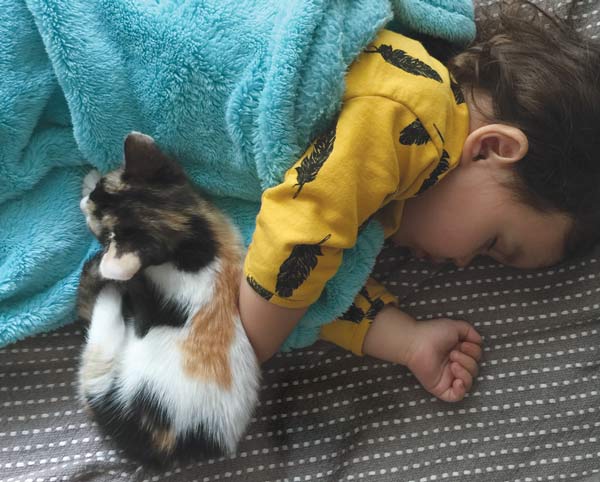There’s nothing like coming home to tiny creatures who look up at you adoringly and greet you with happy faces—and by this, we mean your pets. There are so many lovely animals in Qatar in need of a good home, so if you are thinking of getting a pet, here’s what you should know.

Consider this
The benefits of pet ownership are numerous. Children who care for pets often learn (with parental encouragement, of course) to take responsibility for chores like walking, brushing or feeding. They often develop compassion and empathy for their pets, realising that animals can feel emotions too. “Socially, a lot of children don’t have a lot of interaction with animals,” says Kelly Allen of Qatar Animal Welfare Society (QAWS). “Touching and petting makes them real and gives them an awareness of animal welfare.”
“You can see this when [children] are present at consultations,” says Dr. Rhett Kenmuir, a vet at Qatar Veterinary Center (QVC). “I let them listen with a stethoscope, and they are happy to hear the heart beat. I’ve been told by a three-year-old that I needed to take care and not hurt precious kitty!”
While we heavily encourage pet ownership, it’s not for every family. You need to consider whether your lifestyle is actually suitable for one and whether your landlord allows pets. “A lot of people feel they want an animal but haven’t done their research,” says Kate Lennon, the cat coordinator for Paws Rescue Qatar (PAWS).
Adopt, don’t shop
Notice how we keep using that word adopt? While you can easily buy an animal, we firmly advise against this. There is very little oversight over the domestic breeding industry, and you could well be supporting an unethical breeder.
Unregulated breeders raise puppies and kittens in terrible conditions, as they care far more about profit than animal welfare. Animals are born in cramped and filthy cages to stressed-out mothers in poor health due to near-constant pregnancy and nursing. These mothers often never see sunlight and are abandoned or euthanised once they outlive their usefulness—that is, when they can no longer reproduce.
To save on costs, breeders will often mate their animals with siblings or other related animals, which compounds any genetic problems with the breed. They also cut corners by not providing suitable medical care or nutritious food.
When you buy a pet from an unethical breeder, you are also buying an animal that may have future health problems. It’s sadly not uncommon for store-bought puppies and kittens to die from distemper or parvovirus. “There tends to be a lot of disease from animals being bred, so be careful,” says Dr. Rhett.
We can’t stress this enough. Buying often supports unethical breeders who raise their animals in downright abusive conditions. “I’m not sure if there are ethical breeders either, a lot of puppies and kittens are brought in from Eastern Europe,” adds Kate.
When you adopt an animal from a reputable rescue, you are getting an animal that has been dewormed and cleared of infectious diseases. Rescues also tend to desex, microchip and vaccinate their animals, particularly adult animals. “[With rescues] the hard part is out of the way,” Dr. Rhett adds.
Think you’re ready?
Reputable adoption agencies can help you figure out if your family is ready to adopt a pet, but potential adopters should ask themselves a number of questions, including:
- Is your housing suitable for pets?
- How much time do you or other family members realistically have to care for the animal?
- Do you have enough ready funds for a medical emergency?
- Do you have enough time and patience for training and resolving behavioural issues?
- Are you financially and logistically prepared to take the animal with you when you leave Qatar?
Find a new friend
The personality of the animal and the family must match. Some breeds simply aren’t suitable for this climate (imagine how this heat feels to cold-weather breeds like huskies), while others may need more exercise than you realistically have time for. Also consider whether the breed is good around children—that Jack Russell terrier might look adorable on TV, but they aren’t great pets to have around very young children.
Do consider adopting mixed-breed dogs, as they are typically healthier than purebreds. They often lack the genetic diseases that are more common among purebred animals. Mixed breeds are usually said to have better temperament and higher intelligence. Rescue groups are often familiar with the personalities of their pets so be clear about what you want but do remain open-minded.
Visiting local shelters and interacting with the animals can help you to get an idea of who will work with your family. You may be surprised at who ends up stealing your heart. “Some come firm in mind with what they want and leave with someone completely different,” says Kelly. She says that some families visit a few weekends in a row before they settle on someone. Choose carefully, and you can avoid pitfalls that cause people to rehome their pets.

While puppies and kittens tend to be adopted out fast, don’t overlook older animals. Even with breeds, you can’t always be certain how the personality of a puppy or kitten will develop. With an older pet, what you see is what you’ll get.
Can’t adopt?
If you know that your family can’t make the long-term commitment that pet ownership requires, there are other possibilities to bring the amazing animals of Qatar into your life. Apply to foster a needy animal that’s waiting for a forever home or volunteer at a local pet rescue.
“Lots of families bring their kids to volunteer, and they always leave smiling,” says Kelly. Volunteers help QAWS walk dogs and bathe puppies. Children are also welcome to “socialise” (read: play with) puppies and kittens, helping them become adoptable pets. “Playing with 30 kittens—who’s not going to love it?” laughs Kelly.
Many families pick up a stray animal or two—and that’s perfectly fine. Just get your new friend checked out at a vet clinic. “There are a lot of lovely animals out there,” says Dr. Rhett. “You just need to make sure it’s not carrying any infections.” Once cleared of infectious disease, you can bring your little street cat into her forever home.
General care
Pet care is not cheap in Qatar. The primary reason is that importing equipment and medicine is expensive. Hopefully, all you will need to worry about is spay/neutering and routine vaccinations. But set aside some money just in case your pet falls ill.
Dog owners need to be aware that dogs are not welcome in many local parks due to cultural sensitivities. If possible, choose a dog-friendly compound to ensure your pup gets all the exercise she needs. Whether you are a first-time dog owner, or simply don’t have time to train your pup, ask your rescue agency or vet clinic on recommendations for dog trainers in Qatar.
The recent opening of Al Bidda Park has been a game changer for dog owners, as it allows leashed dogs inside the park. The Pearl and Al Wakrah Beach are other options for dog walking. Just remember to keep your dog on a leash and always clean up after them.
The climate is another concern for dog owners, but Dr. Rhett says this isn’t a huge obstacle. “We do see heat stroke, and people should be aware of it. But I see it a lot less than in the UK because [pet owners in Qatar] are aware of the heat and are not going to take the dog out in the middle of the day!” Stick to walking your dog in the morning and evening hours, and never leave them unattended in a car.

Grooming your pets is a must to keep them healthy—and look utterly adorable to boot. Barkers & Mittens is our absolute favourite (who can resist those jaunty handkerchiefs?) but those keen to bathe their own pets can find organic shampoos, brushes and more at vet clinics.
Qatar has limited pet supplies, and this hits dog owners the hardest. Thankfully, many vet clinics are better supplied than dedicated pet stores and sell reputable pet food brands, kitty and doggy treats, leashes and collars, cat trees and scratching posts, catnip and animal carriers, among other things. You can also find cheap basics like food, treats, leashes, cat litter, some toys and beds in most grocery stores. Carrefour, Lulu Hypermarket, MegaMart, Monoprix and Spinneys tend to have the best stock.
On holiday
Many expats have a jet-setting lifestyle, which is scarcely a problem if you have a live-in maid. For the rest of us, there are a few purpose-built facilities like Pampered Pets and Catari Cat Hotel. PAWS also has boarding facilities, with proceeds supporting their animal welfare activities.
In a pinch, every vet clinic will have boarding facilities. If you plan on boarding or kenneling your animals, be sure to book a spot for them as soon as you know your travel dates—places can get scarce during popular travel seasons. Keep in mind that any reputable company will require your pets to have updated vaccinations, so be sure to keep proof of vaccinations handy.
While dogs are usually fine in boarding facilities, some cats have anxiety outside their “territory”. Get a reliable friend to look after them, daily if possible. “There are pet sitters on Facebook, [do] check their background,” says Kate. She also suggests finding a nanny or maid to help through friends or on Facebook groups.
If you are taking an extended vacation to a country with lenient import and export rules, you could also consider bringing your pet with you on holiday. The process isn’t complex and there are plenty of relocation companies that would be able to assist. In some cases, the cost to bring your pet with you on holiday may be less expensive than boarding or hiring a pet sitter.
Planning ahead
If you have room in your heart and your home for a pet, you absolutely must take them with you when you leave Qatar. The process isn’t all that complicated, but you need to plan ahead. “Lots of people don’t even have vaccinations! If you lost your job and have to go, you’re in a pickle,” says Kimmy Clarkson, a pet relocator and animal rescuer who has an encyclopedic knowledge of import procedures around the globe.
Don’t think you can just rehome your pet. Facebook is full of people trying to unload their pets, and this doesn’t usually end well. Know the financial and logistical outlays ahead of time and you will likely be able to take your pet with you.
Here’s what you need to do:
Step One
Make a list of all countries where you are likely to relocate. Once you have a list, research import procedures for those countries by checking with your rescue agency or online. Our advice is to prepare for the requirements of the most difficult country on your list.
For instance, if you think you might be going to either the UK or Canada next, prepare your pet for entry into the UK—as fulfilling all the requirements for the UK’s import process will automatically prepare you for Canada, as Canadian pet import procedures are far less strict.
Step Two
Make sure your pet is microchipped, then start rabies vaccinations. Virtually all domestic animal import procedures hinge on something called the RATT (rabies antibody titre test).
The RATT is a blood draw that’s performed no less than 30 days after the initial rabies vaccination. If your pet passes, you can travel after a waiting period of 90 days after the blood draw, although a few countries require a waiting period of 180 days after the blood draw. At a bare minimum, you need to prepare four to eight months ahead.
“If vaccines are up-to-date and [your pet has passed] the RATT, you can pretty much go anywhere,” says Kimmy. The RATT is valid for the duration of the pet’s life, as long as you keep their rabies vaccinations up-to-date. (A handful of countries do require a new RATT every two years, please see accompanying chart for more details).
“I recommend everyone do a RATT test, and I organise group RATT days [monthly] to entice people to do it,” says Kimmy. (Find her contact details in the Pet Directory.)
Step Three
Fulfil all other import requirements. Make sure your animal carrier is IATA (International Air Transport Association) approved and within the guidelines set by your chosen airline. You usually book a spot for your animal after you buy your own plane ticket by contacting customer care.
Due to the ongoing blockade, airline choice is limited. Qatar Airways, to its credit, has lowered prices and increased weight allowances for domestic animals. They fly as excess baggage—which means they travel in the cargo hold on your flight. Other airlines may allow small dogs and cats into the main cabin but do check to see if they have blackout dates during the summer and winter season. Snub-nosed breeds, such as pugs, are allowed to fly with Royal Jordanian but are often blocked by other airlines.
While many pet owners understandably prefer to have their pets with them during the flight, it’s not always the best choice, especially if you have anxious animals. The cargo hold is climate controlled and very quiet. Give yourself peace of mind by informing the cabin crew that you have an animal in the cargo hold. Chances are they will inform you when the animal has been loaded onto the plane.
Vets no longer recommend sedating your pet. They have more effective ways to help your animal relax during transport, so work with them to get your pet ready to travel.
Step Four
Before you fly, get an export health certificate from the Department of Animal Resources. The main clinic is located on Al Matar Street, with smaller branches at Al Meena, Al Rayyan and Al Shamal. Bring your pet, your pet’s vaccination cards, your passport and travel itinerary. This permit is valid for 15 days.
Note: You can do the paperwork yourself, or you can outsource part or all of the process to a pet relocator. After all, probably the last thing you want to do in your final weeks is to call airlines and run around government offices.
“Benefits [of pet ownership] far outweigh the negatives, even when you think about travelling back home,” says Dr. Rhett. As expats, our time in Qatar is limited. We can’t predict the future, and sometimes families need to leave sooner than expected. As long as you keep up with the pet import requirements of your home country, you can reliably leave Qatar on short notice.
Consider opening your home to one of Qatar’s needy animals whether through fostering or adoption. It is a rewarding experience, and as long as you understand the import requirements of your home country, there should be no major problems. All other behavioural or medical issues can usually be resolved with the help of a good veterinarian—as well as a little time and patience.
Pet Rescue & Adoption Agencies
We highly recommend adopting a new pet from one of Qatar’s animal rescue organisations. They usually have plenty of suitable puppies and kittens, as well as socialised adult animals. Rescues typically have a few breeds available, so check with them if you have a specific breed in mind. Adoption fees are required and usually run from QR 600-1000. Keep in mind that most adoptable animals have had medical care, so it still works out as cheaper than if you bought directly from a breeder. For animal welfare reasons, we don’t support buying from a pet shop, local breeders or the animal souq.
Paws Rescue Qatar (PAWS)
pawsrescueqatar.org, facebook/pawsrescueqatar
Qatar Animal Welfare Society (QAWS)
5539-6074, facebook.com/qaws.org
2nd Chance Rescue
5540-6254, facebook.com/2ndchancerescueqatar
Pet Export Cheat Sheet
This is by no means an exhaustive list. Regulations can—and do—change at any time.
North America
If you are a pet owner going to North America, you have an incredibly easy import process. Shockingly, nothing more than a fit-to-fly health certificate is required for importing a cat into the contiguous United States, though Hawaii has a fairly strict procedure. Dogs, however, will need a current rabies shot. In Canada, both dogs and cats will need to show proof of vaccination which can be provided by your vet.
Europe (excluding UK)
The European Union requires microchipped domestic animals to have passed the RATT and fulfilled the 90-day waiting period after the blood draw. This is at minimum a four-month process. The good news is that with a yearly rabies vaccination, you’ll only have to worry about the RATT once—it covers the duration of the animal’s life.
United Kingdom
The UK generally follows EU requirements, with one pricey exception—pets must be imported via cargo rather than as excess baggage. Pet relocators may be able to suggest workarounds for those with more time than money on their hands.
The Philippines
The Philippines has a relatively simple process, with a clear list of required vaccinations. But like many other Asian countries, you must have advance approval before your travel date. Although this seems like yet more paperwork, getting prior approval takes some of the anxiety out of the import process.
Australia/New Zealand/Japan/Singapore
Exact procedures for these countries differ, but the waiting period after the RATT is 180 days after the blood draw (three months for New Zealand) and the RATT has validity for just two years. That means you need to do a RATT every 23 months to be fully covered.



